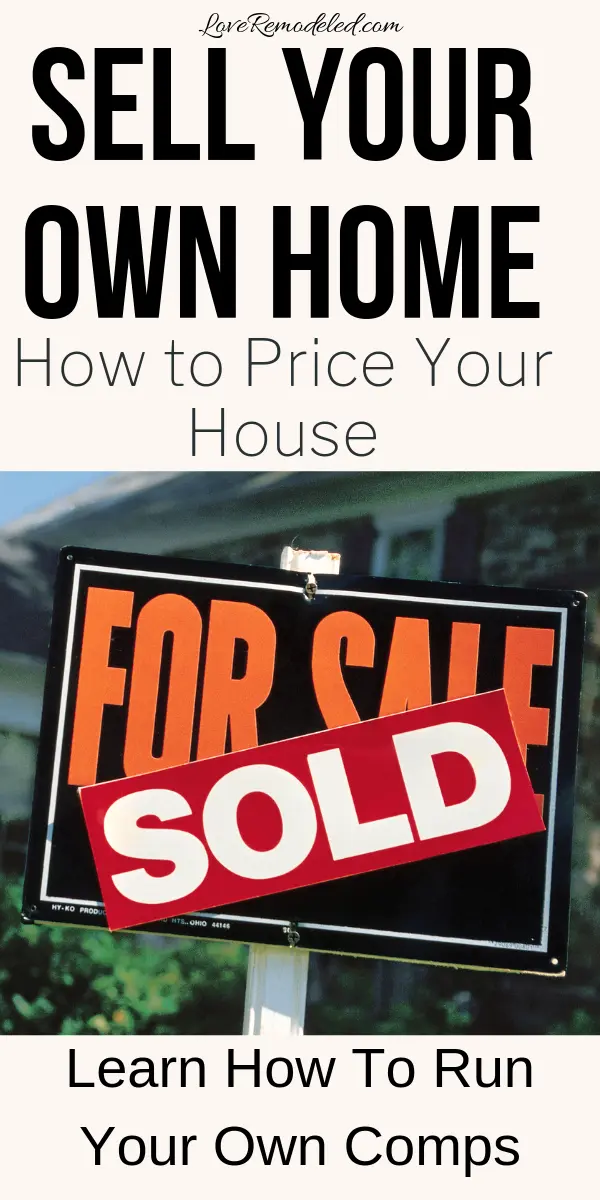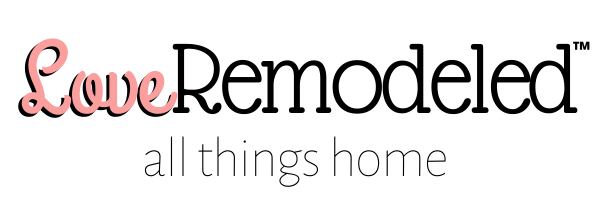House Comps in Your Neighborhood: How to price your home to sell for top dollar!
According to Zillow, pricing your house right helps your home attract more buyers, decreases the amount of time it is on the market, and makes for a smoother selling process. When you are selling your own home, or simply trying to figure out what your home should sell for, you need to come up with recently sold homes in your area that are comparable to your home in a number of factors. The real estate world calls this a comparative market analysis.
Pricing your home so it sells fast isn’t hard, but it requires a great home pricing strategy.
I have used my home pricing strategy of finding Zillow house comps for multiple homes, and sold all of them in less than 8 days. So I know that this strategy works! But, before we get into how to run your own house comps, let’s take a look at what exactly we are looking for.
This post may contain affiliate links. If you have any questions, please see my disclaimer page.
Keep reading for my top secret strategy tip!
What is a comparative market analysis?
A comparative market analysis, or more simply put, finding house comps in your neighborhood, is examining the prices that similar homes have recently sold for in your area.
A comparative market analysis looks at things like the square footage of the homes, the number of bedrooms, the number of bathrooms, the size of the lot, the age of the home, the upgrades that have been performed on the home, and the location. These things all factor into what the price of a home should be.
Typically, a real estate agent will present you with the price that they believe you should sell your house for based on their findings from their market research. But when you are selling your own house, you don’t have someone doing the research for you. You need to do it on your own.
Sure, you could have a real estate agent come to look at your home and give you their thoughts on the selling price. But they are typically doing this because they think they will be getting your business. Running a comparative market analysis takes a little bit of time, for the real estate agent.
Because of this, I have never felt comfortable having a real estate agent come to my house, taking their research and knowledge, and then listing the home myself. It just feels wrong to me.
It’s like if you go to a specialty shoe store, which is probably struggling to stay afloat, talking to the sales agent, getting all the info, picking the perfect shoe in the perfect size, and then ordering it from Amazon. Legal? Yes. But not cool.
So I always run my own comps when I’m selling my own home. And thus far, my strategy has worked out GREAT!
My first FSBO home sold in under 24 hours. My second FSBO home in 8 days. My third home listed FSBO sold in 2 days. All of these homes sold well above my buy price, with modest DIY home improvements. And I only owned the first two for 3 and 1 year respectively, so there wasn’t a ton of market appreciation.
Now, there is a lot to unravel in that last paragraph on how to price your home to sell for sale by owner.
Selling your own home for a profit is easy, but it requires that you learn a bit about how to do it.
If you’re interested in selling your own home, check out my guide on listing it.
Also, take a look at how to hold your own open house (and what to do when your receive an offer).
Read up on how to prep your house to sell fast.
And check out how to take your own real estate photos.
Last, stage your home.
All of these things are essential to selling your home FSBO, quickly, and for a profit. But back to the matter at hand…
Why is a comparative market analysis important?
A comparative market analysis is important because it helps you list your house for the right price.
A home listed too high makes takes longer to sell. The longer a home sits on the market, the more people think there is something wrong with it. If people think there is something wrong with it, they are less likely to come see it. You can’t sell your house if people don’t come see it.
So pricing it correctly from the beginning is SUPER IMPORTANT for making the most money.
Conversely, a home listed too low reduces the amount of money that you will make.
Figuring out the right price for selling your home is really important, and not that hard to do.
The limitations of doing your own comparative market analysis.
There are some limitations to running your own house comps.
First, you don’t have all of the information that a real estate agent has. You only have the information that you find on Zillow (which is actually pretty awesome information).
Second, when you’re trying to run real estate comps, you need to find homes of similar specs. If there are no similar homes, your task is a bit harder.
Third, running a strict comp on recently sold homes in your area may not give you the best idea of what your house should list for, because other factors can come into play.
This third limitation is where we are going to camp out for a bit.
What makes a house a good comp for my home?
Determining whether a home is a good comp comes down to several things. As mentioned above, you need to look at square footage, number of beds/baths, lot size, upgrades, etc. But you also needs to run your house comps on recently sold homes in your area in light of some of the intangibles that you don’t find on Zillow.
By this, I mean things like, is your home (or the comp home) under high tension power lines? That decreases the list price some.
Is there a lot of crime in your home or the comp home’s area? (You can find this information at CrimeReports.com).
Are the school significantly better in one home or the other?
Is one neighborhood filled with similar style, well-kept homes, with sidewalks, and a park down the street, while the other neighborhood has some homes that are falling down, no sidewalks, right by the city dump, etc.
All of these things can affect the price of a home.
And what they boil down to is, LOCATION, LOCATION, LOCATION!
You need to comp your house with recently sold homes in the same type of location. Find comps in your neighborhood, or in neighborhoods that are very similar to yours.
How can I find house comps in my neighborhood?
Down to the nitty gritty now on how to find Zillow comps.
Here is how to find recently sold homes in your area on Zillow.
- Go to Zillow.com.
- Type in your address.
- Go to the map view.
- Click on Listing Type (currently right above the map, next to the Zillow search bar).
- Check For Sale and Recently Sold. Make sure everything else is unchecked.
- Set the number of beds. If you have 3 bedrooms in your home, choose 3+.
- Under Home Type, deselect any homes types that do not match yours. You don’t want to comp your single family home to an apartment.
- Under More, set the number of baths. A 1 bath home sells for a different price point than a 2 bath home, so you need to define this.
- Also under More, define a square footage range. I always set my square foot range to cover about 200 square feet below my home and 200 square feet above. So if I have a 1600 square foot home, I define this as 1400-1800.
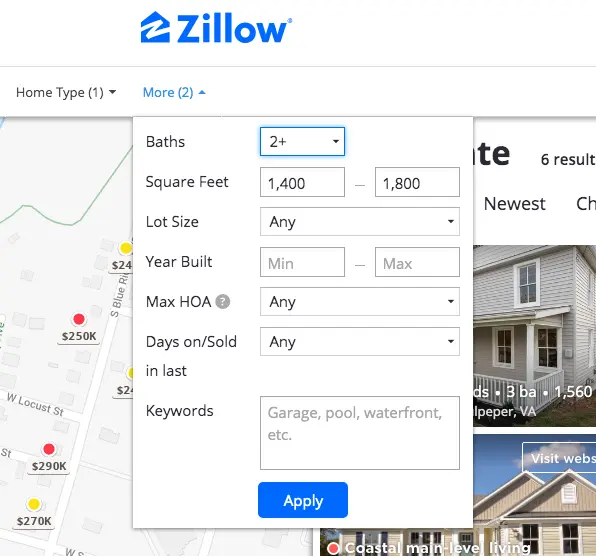
Now you should see a refined map with homes with either red (for sale) dots or yellow (recently sold) dots. These homes are what you want to be focusing on.

Next, whittle out unhelpful Zillow comps to figure out which homes are actually a true comp.
Start by defining the neighborhood. Ideally, you will find great comps in your own neighborhood.
To do this, you can use the Draw feature on Zillow to make a circle around your neighborhood, and then it will only show you homes in that circle.
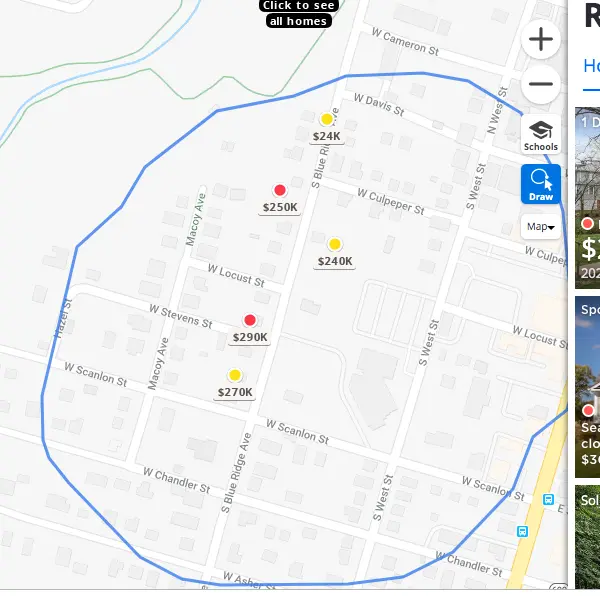
The homes in the circle above should be my best comps.
See how there is that one home for 24K? Exclude that one. Its priced way too low, for who knows what reason. Maybe it was sold to family, or has mold, or needs gutted. Regardless of the reason, even though it is a 3 bed, 2 bath home with similar square footage, its not a good comp.
But all of the others can give you some good information about what your house should sell for.
Less specifically, you can define it by zip code. To do this, you can put your zip code in the Zillow search bar.
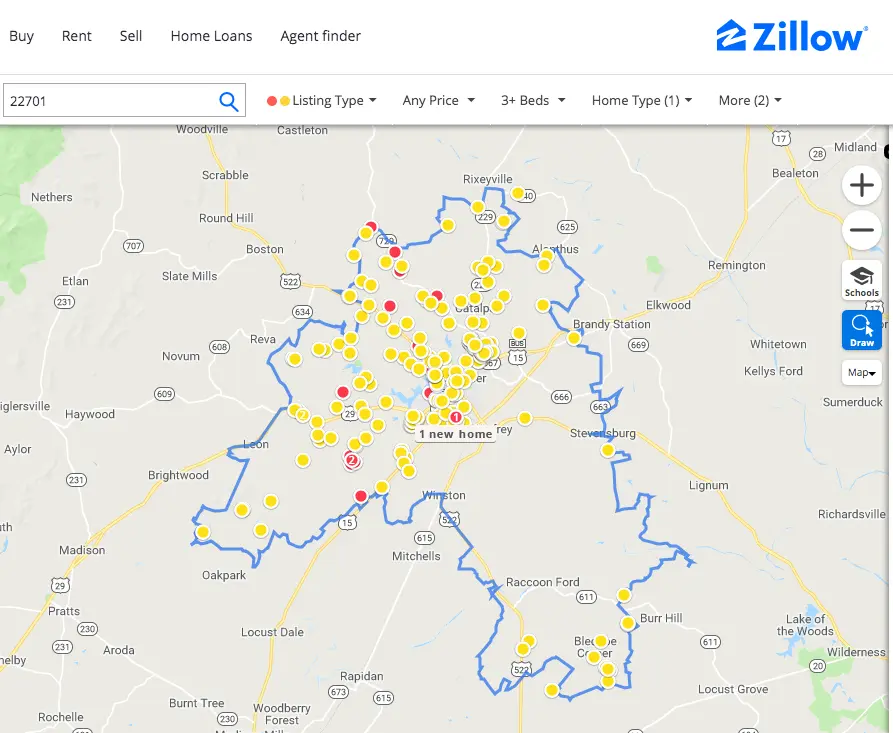
See how huge that zip code is? Clearly, there will be many types of homes in this zip code. Some will be very rural, and some will be in the city. Some will have septic systems and some will have city sewage. And on and on.
The zip code option is not my favorite, and here is why. It doesn’t factor in the LOCATION, LOCATION, LOCATION aspect of it. If you do choose the zip code option, go back up to that section, re-read it, and remove any neighborhoods or sections that aren’t good comps for your home.
Now that you’ve narrowed down your comp options, choose 3-5 best comps.
Your best comps will, ideally, have the same specs as your house.
For example, let’s say your specs are this:
2000 sq. feet, 3 bed, 2 baths, one car garage, remodeled kitchen, 1/4 acre lot, built in 1996.
A best comp to your home may look like this:
2100 sq. feet, 3 bed, 2 baths, one car garage, remodeled kitchen, 1/3 acre lot, built in 1998 four houses down from yours.
So, let’s go back to the picture where we defined all of the settings on Zillow, circled the neighborhood, and have our map of red and yellow dots.
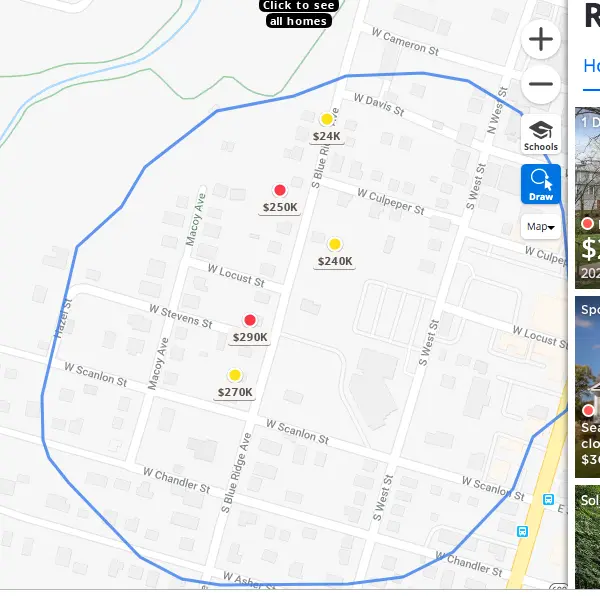
Remember, we are excluding the 24K home. But all of the others are great comps.
Click on each dot and see how they compare to your home. They should all have the same beds, baths, approximate square footage and home type, since you defined your settings by those things.
Now, go through the pictures and see how they look.
Note their upgrades. More on this later.
Note the general feel of the house from the pictures. If the house looks like hoarders live there, it probably sold for less than yours will with your amazing staging.
Choose Zillow comps that are as close to your house as you can get.
What if I can’t find good house comps in my neighborhood?
When running your own comparative market analysis, you don’t always finds comps like the example above.
So you have to equal out the comps.
For example, in my area, a garage is worth $20,000. A remodeled kitchen is worth $25,000. A fenced yard is worth $2000.
Conversely, high tension power lines in your backyard bring the price down by $10,000.
Figure out what the specific items you’re needing to equal out cost in your area by googling the projects completed. HomeAdvisor.com is a great site for figuring out what home improvements cost in your area. Then, take that information and either add the cost or subtract the cost based on your specific needs.
Let’s use the example above.
I have a 2000 sq. feet, 3 bed, 2 baths, one car garage, remodeled kitchen, 1/4 acre lot, built in 1996.
Let’s say that one of the best comps I can find is a 2200 sq. foot home with 3 beds, 2 baths, no garage, an original kitchen, 1/4 acre lot, built in 1990. It sold for $210,000.
For this home, I would take the price of the Zillow comp and add $20,000 for my garage and $25,000 for the remodeled kitchen. So a fair market price for my house would be $255,000.
Be sure to do this for several homes. You need about 3-5 homes as comps so that you come up with a good average price.
Important things to remember when running your own comps on your home.
When you’re running comps on your own home, its important to remember to take any emotion out of the equation. Sure, you may LOVE your remodeled kitchen and HATE your neighbor’s remodeled kitchen, but the comps equal out despite the particular style.
Also, remember that basement square footage counts, but not the same as above grade square footage. Put another way, a house with 1000 square feet on the first floor is worth more than a house with 1000 square feet total, with 500 square feet above grade and 500 square feet below grade.
And last, remember to look at similar neighborhoods, and not just zip codes.
Let me give you a story to show why I say this.
When I was selling my first home, it was in a great little neighborhood that I was SURE was undervalued. It was a sub-neighborhoods of one of the most desirable neighborhoods in the city, but it was a different zip code.
Because it wasn’t in what realtors considered the “best” or most desirable zip code of the city, which had tiny homes, on tiny lots, with tons of traffic, but walking distance to shops, realtors put lower price tags on the homes in my neighborhood.
In contrast to the hot section, my neighborhood had homes that felt way more spacious (though the same square footage), larger lots, caul de sacs, and easy access to the highway.
Any normal person would look at this situation and say that the homes in my sub-neighborhood should be worth more.
But since they were in a different zip code, (in a zip code that was adjacent to the “best” zip code), and some neighborhoods in my zip code were not as nice, realtors comped our homes with bad neighborhoods in our zip code instead of the homes in a similar neighborhood in the “best” zip code. As a note, other things were equal: schools, safety, etc.
With this in mind, I took a gamble. When we were about to move, I decided to price my house at what I thought it should sell at, instead of what a realtor thought it should sell at.
To do this, I looked at comparable homes on the market currently on Zillow, in the hot zip code, and…
Here is where my top strategy tip on pricing your own home comes in!
… priced mine *just* under them.
So when buyers looked through Zillow, they found a list of homes. Most of them were small, tight spaces, with tight yards, and a ton of traffic to get anywhere.
But then there was mine. Similar square footage but spacious feeling, large yard, 5 minutes to anywhere, on a caul de sac, and cheaper than all of the other homes.
Think about it. When you look at Zillow, you look at areas. And if you don’t find anything you like, you zoom out just a tad. Most people don’t search by zip code, they search by areas.
My gamble paid off. People didn’t care that I was in a different zip code, they just cared that I was close to the most desirable neighborhood.
And THAT is why I sold my house in under 24 hours.
Because I comped it the way I did, I made over $30,000 more than a realtor would have told me I should sell my house for (I know this, because several neighbors went with realtor estimates and made way less than me!). And by taking that gamble, I raised the bar for my whole neighborhood, increasing the selling value for all the homes there.
So when running your own comps in your neighborhood, take all of this into consideration.
Consider the home itself, the upgrades, the schools, the safety, and the location. And if you want to sell it really fast, follow my strategy, and price your home just under your comps.
Good luck selling your home! I hope that this guide on finding Zillow house comps in your neighborhood is helpful for you. And before you leave, remember to check out all of my other information on selling your home on your own!
How to hold your own open house (and what to do when your receive an offer).
How to prep your house to sell fast.
How to take your own real estate photos.
How to stage your home to sell.
In closing, remember that the best way to sell your house fast is to be the best house on the market in your price range.
House Comps in Your Neighborhood: How to price your home to sell for top dollar!
